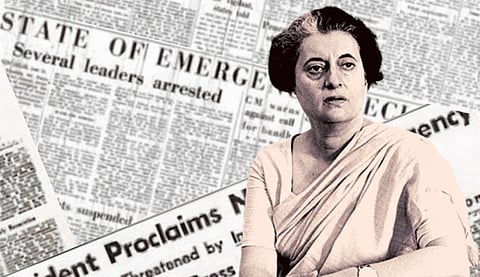
- Home
- Live Blog
- Breaking News
- Top Headlines
- Cities
- NE News
- Sentinel Media
- Sports
- Education
- Jobs

(A recall of the emergency)
Shantanu Thakur (thakur.santanu@gmail.com)
Bad memories are unpleasant to be raked up, but sometimes it becomes necessary to recall the past in order to ward off apprehensions of probable recurrence. The Emergency of the mid-seventies is one such nightmare from the past. It completed fifty years this June, and the unhappy anniversary hasn’t gone quite unnoticed either. To those of us now into our seventies, that period of independent India’s history is unforgettable, but to the younger generations, it is not quite a familiar memory. A look back into those stressful days may help to prevent history from repeating itself.
During the period when the Emergency was declared, we were doing our master’s—young, impressionable, youthful minds all. One of our sensitive, meritorious classmates—a budding talent of promise—had scripted a one-act play which (given the young age of the playwright) was a masterpiece satire on the events that led to the buildupof the Emergency, which culminated in its declaration. The play was called “Ajanti Mulukot 1974.” Justifiably, it bagged all the prizes in the annual University Week in the drama section. It was later developed into a full-fledged play. Why does this deserve a reference? Because democracy in India is precious and needs to be constantly protected and preserved (to use a now hackneyed Assam Accord expression, not necessarily out of context). Ghosts of threat bide their time lurking behind your backs, and only alert awareness may stop them from swooping down. And awareness of the young generation about pitfalls of such lapses in the democratic process is important.
During the trial where eventually he was given a death sentence, Muhammad Ali Jinnah had reportedly referred to India as a case of a “chaotic and noisy” democracy. As a leader with a strong autocratic bent, it wasn’t unnatural for him not to appreciate the noise of dissent. But vocal, vibrant, and noisy dissent are the elements of a thriving democracy. History stands witness to that. Any effort to stifle the dissenting voice is an attempt to choke democracy. Dissent is the heartbeat and the breath of democracy. The infamous Emergency had given us a taste of that. Democratic processes are visibly under pressure the world over. Such tendencies have surfaced in the USA too under the Trump 2 regime. However, the good thing is that strong protests in the US have erupted simultaneously. On the very day when POTUS did a display of the might of the formidable US military arsenal, huge protests in the manner of “no Kings” rallies thronged the streets of America. That is a sign of a vibrant democracy.
The age-old story comes to mind with spontaneity. The all-powerful madcap king was walking the streets with not a shred on him; bystanders stood by and watched without a murmur. It needed a kid to shout out, “But the king is naked!” This amusing story highlights two fundamental aspects of democracy: first, that citizens normally are scared to speak out; and second (which is far more important), that the mighty king did not necessarily hang the kid. Democracy needs some noise; it needs people to speak out.
Though thriving in quite a few nations of the world, democracy by its very nature is fragile material that needs to be handled with care. It doesn’t take very long for leaders to develop autocratic tendencies (sometimes perhaps even unconsciously) unless systematic, in-built procedures are in place to thwart such leanings. Emergency-like scenarios may surface without an open ‘declaration’; draconian measures could be made to enter through the backdoor, through deceptive instruments of government procedures and legislation. There can be no guarantee against a return of emergency in the future (after all, the constitutional provision does exist) unless all institutions established under the Constitution freely function in the exercise of their duty. Nations, in the immediate aftermath of birth, create the institutions; thereafter, the institutions create the subsequent leaders. Any methodical erosion in the independence of institutions is a body blow to democracy. Quite a few amendments made to the Constitution after independence are already being questioned in several learnt quarters. Strengthening of institutions and adequate safeguards in the Constitution are therefore of prime importance. Not that an arrogant majority will not try to trample even on sacred provisions; they might as well. That is why protests are necessary.
A US ambassador to India had once described us as a “functional anarchy.” His take also had an eye on the many forms of democratic protests in India. We are, no doubt, a nation of “argumentative Indians,” and it is in our own interests that we stay that way. The voice of the people is the first fundamental requirement of a democracy. Let there be no impediments to that. We have turned enough deaf ears to burning cauldrons such as the one at Manipur, in spite of our proud democracy. The anniversary of the Emergency should be a time for creating safeguards against a probable repeat. For that, a vociferous, open airing of meaningful dissent is necessary, not attempts at gaining political mileage, but democratic progress. Sir Jinnah is entitled to his prejudices, but we Indians will any day welcome a healthy democracy, no matter how noisy and chaotic.